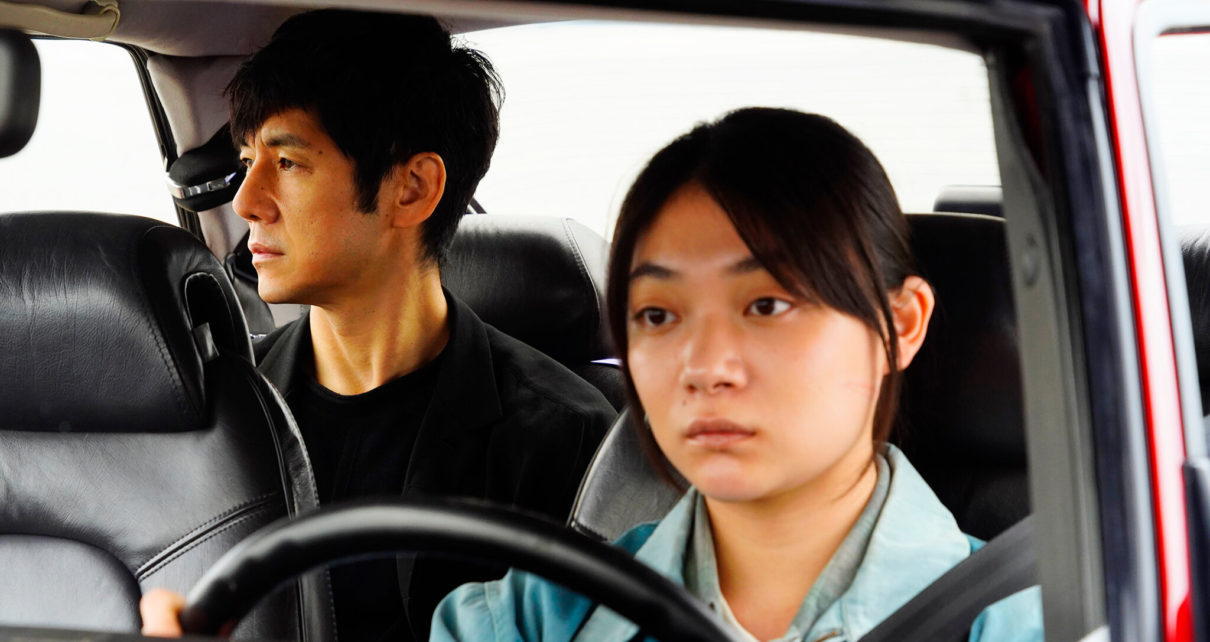You’re gonna be reading subtitles at some point. You just are. This is a Japanese film with additions of English, Korean, either Japanese or Korean sign language (not sure which), all revolving around a stage production of Uncle Vanya, a play written by Russian doctor Anton Chekhov. Now I don’t doubt there are brains out there capable of being fluent in Japanese, Korean, English, Russian, and either Japanese or Korean sign language (not sure which), but I’m pretty sure that doesn’t describe more than a handful of people on the planet, if any. And then those have to choose to see Drive My Car, which is yet another intersection in this Venn diagram.
Let me reiterate: Drive My Car is three hours long and at some point you’re gonna be reading subtitles, no matter who you are. Now that we’ve gotten that unpleasantness out of the way, we can proceed.
Before we get to the multi-language Uncle Vanya, we gotta set-up. Yūsuke Kafuku (Hidetoshi Nishijima) is a stage director who loses his wife. Damn shame on so many levels, not the least of which is that Oto (Reika Kirishima) was a screenwriter who did her best work after having sex. She would have sex and instead of post-coital cigarette or reflection or sleep, she’d delve into long, intricate narratives.
“Honey, I have a 3 PM deadline. Get out the lube and the recorder.”
Ah, but I digress. Drive My Car is hardly a comedy. Oto wasn’t faithful and died in tragic fashion. Now the (ironically) direction-less Yūsuke has to figure out what to do with his life. He gets hired to direct Uncle Vanya and among other things, his contract stipulates that he must have a driver … which actually works out as Yūsuke’s eyesight is failing him and he likes to rehearse with an audio recording as he drives – and damn, when you’re driving, the costume changes can be a bitch!
Seriously, his driver is the scarred young Misaki (Tôko Miura). She’s quiet, the broken kind of quiet. Don’t worry, the film is three hours long; eventually we’ll hear all about her pain. In the mean time, Yūsuke gets to arrange his cast, which includes a twentysomething hellraiser playing the title role and a woman who signs in Korean (I looked it up in-between paragraphs). Some of the cast doesn’t speak Japanese; some of the cast doesn’t speak Korean; one of the cast doesn’t speak, period. If you’re in this Uncle Vanya audience, you’re reading subtitles, too.
Fittingly, and perhaps strategically so, Drive My Car is about communication, both spoken and unspoken. Yūsuke and Misake are damaged people. They have to figure out how to move on; it won’t be easy, and it can’t be done alone. Ryûsuke Hamaguchi is big into speechifyin’. He’s also big into art as more than just a reflection of life; there’s no coincidence our hero is a stage director, nor is it coincidental than Uncle Vanya is the subject (especially the parts which seem to relate to personal issues). Hamaguchi is one of these directors who has no tolerance for pithiness or glib or sentences which don’t end up describing the human condition. This film can be a lot. And I mean a lot a lot. I mean the kind of film you plan your weekend around.
art as more than just a reflection of life; there’s no coincidence our hero is a stage director, nor is it coincidental than Uncle Vanya is the subject (especially the parts which seem to relate to personal issues). Hamaguchi is one of these directors who has no tolerance for pithiness or glib or sentences which don’t end up describing the human condition. This film can be a lot. And I mean a lot a lot. I mean the kind of film you plan your weekend around.
Drive My Car will be seen as a masterpiece to those who watch Daniel Day-Lewis for fun. It’s impossible to call the film “enjoyable;” it’s just too heavy. But I’d be doing the world a disservice to pan it. Drive My Car may not be revered by those who tend to watch films about people driving cars, but it is a work of art and a worthwhile watch if you’ve got a weekend to plan for it.
When it comes to films about transportation
You might find problems with communication
But if there’s much axle grease-l
And the film stars Vin Diesel
You probably don’t need any translation
Not Rated, 179 Minutes
Director: Ryûsuke Hamaguchi
Writer: Ryûsuke Hamaguchi, Takamasa Oe
Genre: Encompassing your entire evening … but worth it
Type of being most likely to enjoy this film: Who likes subtitles?
Type of being least likely to enjoy this film: Non-thinkers



